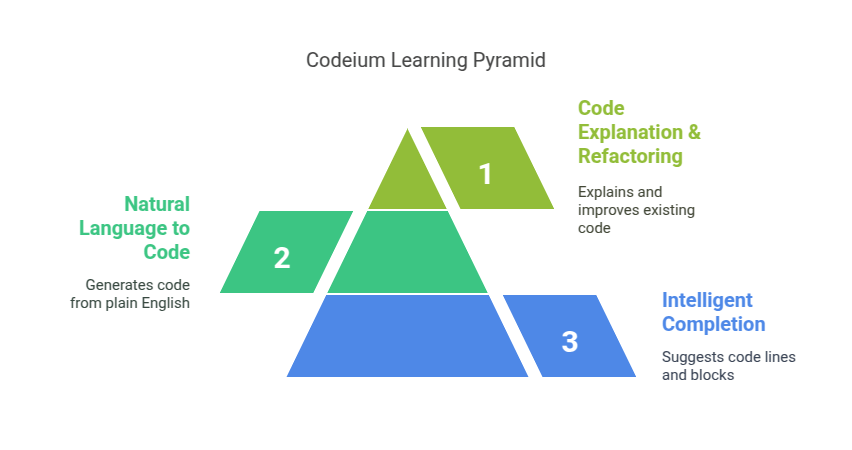Codeium boosts your Learning To Code journey. Overcome coding challenges faster, understand concepts better, and ship projects quicker. Start your coding transformation today!
Codeium Simplifies Even Complex Learning To Code
Alright, let’s talk straight.
Learning anything new is tough.
Learning to code? That’s another level.
Syntax errors, obscure documentation, staring at a blank screen wondering where to even start.
It’s enough to make you want to quit before you even write your first ‘Hello, World!’.
The world of Learning and Education is changing fast.
AI isn’t just for tech giants anymore.
It’s getting into everything.
And yeah, that includes how we learn stuff.
Especially something like coding.
You’ve probably heard the buzz. AI code assistants, code completion tools.
They’re everywhere.
But are they just hype?
Or can they actually make a difference when you’re deep in the trenches, trying to wrap your head around loops or object-oriented programming?
Specifically, can a tool like Codeium actually help you learn?
Not just copy-paste code, but truly understand it.
That’s the million-dollar question, right?
Because let’s be real, just getting code to work isn’t the goal.
The goal is to become a capable coder.
Someone who can build things from scratch.
Someone who can debug problems like a pro.
Someone who gets *why* the code works the way it does.
I’ve spent some time kicking the tires on Codeium.
Not just using it for my own projects, but thinking about it from the perspective of someone trying to learn.
Someone who’s just starting out or maybe hit a wall.
Does it make the path smoother?
Does it speed things up without sacrificing understanding?
Can it really simplify Learning To Code?
Let’s find out.
No BS, just the facts.
Here’s what I found.
Table of Contents
- What is Codeium?
- Key Features of Codeium for Learning To Code
- Benefits of Using Codeium for Learning and Education
- Pricing & Plans
- Hands-On Experience / Use Cases
- Who Should Use Codeium?
- How to Make Money Using Codeium
- Limitations and Considerations
- Final Thoughts
- Frequently Asked Questions
What is Codeium?
Okay, first up, what exactly are we talking about here?
Codeium is an AI-powered code completion and assistance tool.
Think of it as your co-pilot in the coding editor.
It uses machine learning models trained on vast amounts of code.
Its main job is to predict what you’re trying to type next.
And offer suggestions.
Everything from finishing the current line to generating entire functions or code blocks.
It integrates directly into your coding environment.
Visual Studio Code, PyCharm, Sublime Text, you name it.
It supports pretty much every popular IDE.
And it works with a huge number of programming languages.
Python, JavaScript, Java, C++, Go, Rust, and many, many more.
It’s designed for developers, sure.
To make them faster, more efficient.
Reduce boilerplate code.
Catch potential errors early.
But the question we’re digging into is: how does this benefit someone who’s learning?
Someone who’s not already a coding expert.
Someone who needs to understand the fundamentals, not just generate code they don’t grasp.
Codeium claims it can help with this.
That it’s not just a crutch for seasoned pros.
That it can actually act as a tutor, a guide.
Help you see patterns.
Suggest standard ways of doing things.
And yes, help you get unstuck.
Which, let’s be honest, is a massive hurdle when you’re learning to code.
Hitting a wall you can’t climb over is the number one reason people give up.
If Codeium can lower that wall, even a little…
That’s a win.
It positions itself as an AI assistant for developers.
But maybe, just maybe, its biggest impact is on the developers of tomorrow.
The people struggling with tutorials right now.
Trying to build their first app or website.
Let’s look at the specific ways it claims to help.
And whether those claims hold up.
Especially in the context of Learning To Code.
That’s the focus.
Key Features of Codeium for Learning To Code

Alright, let’s get specific.
What does Codeium actually do that matters if you’re learning?
- Intelligent Code Completion:
This is the core function.
You start typing, and Codeium suggests the rest.
Not just simple words, but entire lines, blocks, or even functions.
For a beginner, this is huge.
It shows you how code is typically written.
Correct syntax, common patterns, standard library calls.
It’s like having a coding cheat sheet that pops up exactly when you need it.
This speeds up the typing part, obviously.
But more importantly, it exposes you to correct code structure repeatedly.
Muscle memory for coding starts to build.
You see how loops are constructed, how functions are defined, how classes are structured.
It’s passive learning, but it’s effective.
You start internalizing these patterns just by accepting the suggestions.
Less time debugging typos, more time understanding logic.
- Natural Language to Code:
This is where things get really interesting for learners.
Codeium lets you describe what you want in plain English.
And it attempts to generate the code for you.
Imagine you’re trying to figure out how to read a file line by line in Python.
Instead of sifting through Stack Overflow, you type a comment like `# Read the file ‘myfile.txt’ line by line`.
Codeium might suggest the `with open(…)` block and the loop structure.
This isn’t a magic bullet.
The generated code isn’t always perfect.
But it provides a starting point.
A template.
You can look at the generated code and begin to understand *how* the natural language request translates into actual code.
It bridges the gap between your intent and the implementation.
It helps you see the structure required for common tasks.
This is especially useful when you know *what* you want to do but not *how* to express it in code.
It’s like asking a more experienced coder, “How would I do this?” and getting a working example instantly.
- Code Explanation and Refactoring:
Some versions and integrations of Codeium offer features beyond just generation.
They can explain blocks of code.
Highlight a function you don’t understand, and Codeium can give you a summary of what it does.
This is invaluable when you’re working with existing code, examples from tutorials, or even your own code from last week that you’ve already forgotten how it works.
Understanding *why* code does what it does is critical for learning.
Just looking at syntax isn’t enough.
An AI explanation can break down complex logic into simpler terms.
Additionally, some tools can suggest ways to refactor or improve your code.
Suggesting more efficient ways to write something or pointing out potential bugs.
This provides real-time feedback.
It’s like having a senior developer doing a mini code review on the fly.
You learn best practices not just by reading about them, but by seeing them applied to your own code.
These features turn Codeium from just a code generator into a potential learning assistant.
Helping you not just write code, but understand and improve it.
For someone focused on Learning To Code, this layer of explanation and feedback is arguably more valuable than the raw code generation speed.
Benefits of Using Codeium for Learning and Education
So, how does all that translate into actual benefits for someone slogging through coding lessons?
Let’s break it down.
Faster Progress: This is the most obvious one. Typing less, getting suggestions, seeing code snippets appear – it all speeds things up. When you’re learning, momentum is key. Getting stuck for hours on a syntax error or a trivial function can kill your motivation. Codeium helps you bypass these small roadblocks. You spend less time fighting the editor and more time focusing on the logic of your program. This faster pace keeps you engaged and helps you cover more ground in the same amount of time. You build projects faster, finish tutorials quicker, and get to the “aha!” moments sooner.
Reduced Frustration: Coding *is* frustrating. Everyone who codes knows this. Errors are constant companions. Codeium can reduce some of the most common frustrations. Syntax hints prevent typos. Boilerplate generation means less repetitive typing. Getting a jumpstart on a function you’re stuck on is a lifesaver. Less frustration means you’re more likely to stick with it. Persistence is half the battle when learning any hard skill. By smoothing out some of the rough edges, Codeium makes persistence easier.
Exposure to Correct Code: As mentioned, seeing Codeium’s suggestions repeatedly helps you learn standard practices. It’s like osmosis. You see how functions are typically named, how variables are declared, how common tasks are handled in different languages. This builds intuition. You start writing better code almost without thinking about it, because you’ve seen the good examples pop up again and again. This is particularly useful when moving between languages or frameworks. Codeium can quickly show you the idiomatic way to do things in a new environment.
Understanding Complex Concepts: The natural language query feature and code explanation capabilities are powerful learning aids. Struggling with recursion? Ask Codeium to generate a recursive function for a simple task, then ask it to explain it. Seeing the code *and* getting an explanation helps solidify understanding. It provides multiple angles of approach to a problem. Reading documentation is essential, but seeing working code generated from a simple description, and then getting that code explained, adds another powerful dimension to your learning toolkit.
Confidence Boost: Getting code to run, even with help, feels good. Seeing a program you designed actually work is a massive confidence booster. Codeium can help you get there faster and more consistently. Every successful run, every feature implemented, reinforces your belief that you can do this. Building confidence early is crucial in the learning process. It helps you tackle harder challenges and stick with it when things get tough.
These aren’t small things. Learning and Education platforms and individuals constantly look for ways to improve learner retention and success rates. Tools that reduce friction, frustration, and time-to-success are incredibly valuable. Codeium, when used correctly, can be one of those tools. It doesn’t replace learning the fundamentals, but it can make the journey significantly less painful and more productive.
Think of it like learning to drive with a GPS. You still need to learn how to operate the car, understand traffic laws, and develop road sense. But the GPS helps you navigate unfamiliar routes, avoid getting lost, and reach your destination more efficiently. Codeium is like the GPS for your coding journey.
Pricing & Plans

Okay, let’s talk money. Or lack thereof, in some cases.
One of the most attractive things about Codeium, especially for students and individuals Learning To Code, is the pricing structure.
Codeium offers a very generous free tier.
For individual developers, it’s free.
No cost for personal use, hobby projects, or yeah, learning.
This is a big deal.
Many AI coding tools are expensive.
Putting a barrier of entry like a monthly fee right upfront can discourage learners.
Codeium removes that barrier.
You can download the extension, install it in your favourite IDE, and start using its core features immediately without paying anything.
The free plan includes unlimited code completion.
It includes the natural language to code generation.
And it covers a wide range of languages and IDEs.
So, for the vast majority of people learning to code, the free version is more than enough.
It gives you full access to the features that help with learning.
There is a paid plan, Codeium Teams.
This is aimed at commercial use, teams, and companies.
It offers additional features like enterprise-grade security, dedicated support, and potentially customisation or fine-tuning for internal codebases (though check their latest docs for specifics on this).
But for you, trying to get better at Python or build your first JavaScript app?
Free. Zero cost.
How does this compare to alternatives?
Competitors like GitHub Copilot have a monthly fee (though they sometimes offer trials or student discounts).
Other tools might have stricter limits on free usage or fewer features available without paying.
Codeium’s free individual plan is arguably one of its strongest selling points, especially in the context of Learning and Education.
It democratises access to powerful AI coding assistance.
Anyone with a computer and an internet connection can start using it to help them learn, without worrying about subscription costs.
This makes it a very attractive option for students, bootcamp attendees, and self-learners.
You can integrate it into your workflow from day one.
Experiment with it.
See if it helps your personal learning style.
Without any financial commitment.
That’s a smart move by Codeium.
It lowers the barrier to entry significantly.
And lets the tool speak for itself based on its utility.
Hands-On Experience / Use Cases
Okay, enough theory. How does this actually play out when you’re in the editor, trying to code?
I tried using Codeium while working through some coding exercises and building a small project, simulating the experience of a learner.
Here’s what I noticed.
Starting Small: When writing basic functions, like a function to calculate the factorial of a number, Codeium is incredibly helpful. You type `def factorial(` and it immediately suggests `n):`. Then you type `if n == 0:` and it suggests `return 1`. Type `else:` and it suggests `return n * factorial(n – 1)`. It practically writes the common implementations for you. For a beginner, seeing these standard implementations pop up teaches you the common ways to solve problems. You still need to understand *why* it works, but you don’t get bogged down in the exact syntax.
Building a Simple Project: Let’s say I wanted to build a simple web scraper in Python using BeautifulSoup and Requests. I know I need to fetch a URL, parse the HTML, and find specific elements.
I might type `# Fetch the content of a URL`. Codeium suggests code using the `requests` library.
Then I type `# Parse the HTML content`. Codeium suggests using `BeautifulSoup`.
`# Find all links on the page`. Codeium provides the `soup.find_all(‘a’)` pattern.
Each step provides a code snippet. It’s not doing the *thinking* for me, but it’s doing the *typing* and recalling the exact library calls. This lets me focus on the sequence of operations required for web scraping, rather than remembering the exact function names or parameters for Requests and BeautifulSoup. It’s like following a recipe where some ingredients are magically prepared for you when you need them.
Debugging Help: While Codeium isn’t a debugger, its suggestions can sometimes steer you away from common errors. If you’re writing code in a way that’s syntactically incorrect or goes against common patterns, its suggestions might be completely different from what you expect. This can be a hint that you’re going down the wrong path. Also, the ability to ask it to explain a complex error message you paste in (in some interfaces) can be a quick way to get a layman’s explanation of what went wrong.
Understanding Examples: When I copy-paste code examples from tutorials or documentation, I can use Codeium’s explanation feature (if available in my IDE’s plugin) to get a quick summary. This is much faster than trying to decipher every line myself, especially in a new language. It gives me the gist, and then I can dive into the details.
Learning New Libraries/Frameworks: When you start using a new library, the API can be overwhelming. Codeium’s completion feature helps immensely here. As you type the object name, it shows you available methods and properties. This exploration via suggestion is a fast way to learn what a library can do and how its components are named. It’s interactive documentation built into your editor.
Overall, the experience feels like having a very knowledgeable pair programmer who is sometimes a bit too eager to finish your sentences.
You still need to guide it.
You still need to understand the code it generates.
Blindly accepting suggestions without understanding is a fast path to writing buggy, unmaintainable code.
But used as a tool to accelerate typing, explore options, see standard patterns, and get explanations, it absolutely enhances the learning process for Learning To Code.
It removes friction.
It provides hints.
It lowers the time spent on tedious stuff and increases the time spent on core concepts and building.
That’s a solid win.
Who Should Use Codeium?

Alright, who gets the most bang for their buck with Codeium, specifically when it comes to learning?
Short answer: Pretty much anyone who is Learning To Code.
Let’s break it down a bit more.
Complete Beginners: If you’re just starting out with your first programming language, Codeium can be a massive help. It guides you through basic syntax, reduces typos, and shows you how simple programs are structured. It lowers the initial frustration curve significantly. Think of it as training wheels. They help you get going, build confidence, and understand the motion before you need to balance entirely on your own.
Students (High School, University, Bootcamps): Students are constantly working on exercises, projects, and learning new concepts. Codeium can speed up assignments, help understand complex examples given by instructors, and provide alternative ways to solve problems. It’s like having a free TA available 24/7 to help with syntax and basic structure. It allows students to focus on the logic and algorithms, which are often the harder parts to grasp, rather than getting stuck on remembering specific function names.
Self-Learners: If you’re teaching yourself using online resources, books, or video tutorials, you often don’t have immediate access to a human mentor. Codeium can fill some of that gap. Its ability to generate code from natural language queries and explain code snippets can act as a stand-in when you’re stuck or need a quick explanation. It provides interactive assistance that static resources can’t offer.
Career Changers: Moving into a tech role often requires picking up new programming skills fast. Codeium helps accelerate this learning process by making coding faster and providing exposure to idiomatic code in new languages or frameworks. It helps you become productive quicker, which is important when you’re trying to prove yourself in a new field.
Experienced Developers Learning New Skills: Even if you’ve been coding for years, picking up a new language or a complex new framework is like being a beginner again in that specific area. Codeium is incredibly useful here, providing completion and generation for APIs you’re unfamiliar with. It smooths out the transition and lets you leverage your existing programming knowledge without getting stuck on new syntax details.
Educators and Tutors: While not directly *using* it for their own learning in this context, educators can recommend Codeium to their students. They can also potentially use it to quickly generate example code snippets for lessons or to demonstrate common programming patterns. It’s a tool they can point learners towards to help them outside of structured lesson time.
In short, if your goal involves writing code and getting better at it, Codeium can likely help.
It’s not a replacement for understanding the fundamentals, but it’s a powerful accelerator and frustration reducer.
And because the core features are free for individuals, there’s virtually no barrier to trying it out.
Anyone in the Learning and Education space focused on coding should seriously consider integrating Codeium into their toolset or recommending it to their learners.
How to Make Money Using Codeium
Okay, let’s flip the script slightly. If Codeium helps with Learning To Code and becoming a better developer, how can that translate into making some cash?
This isn’t about Codeium itself paying you, obviously.
It’s about how using Codeium makes you more efficient, more skilled, and more capable of offering services that people pay for.
- Service 1: Freelance Coding:
This is the most direct route.
As you learn to code, you can start taking on small freelance projects.
Building simple websites, writing scripts to automate tasks, creating small applications.
Codeium makes you faster at this.
Generating boilerplate code, getting quick suggestions for API calls you don’t fully remember, speeding up repetitive tasks.
This means you can complete projects quicker.
More completed projects equals more money.
Even as a beginner, you can start with very small, low-paid tasks to build your portfolio and skills.
Codeium helps you deliver results faster, making you more competitive.
- Service 2: Technical Content Creation:
If you’re learning, you’re in a prime position to teach others slightly behind you.
You can create tutorials, blog posts, or video guides about the coding concepts you’re learning.
Codeium can help you quickly generate accurate code examples for your content.
Need a Python script to demonstrate loops? Type a description, and Codeium gives you a starting point.
Need code for a simple web page? Codeium can help generate the HTML/CSS structure.
Faster code example generation means you can create more content.
Monetize this content through ads, affiliate marketing (e.g., recommending Codeium or other tools), selling premium guides, or building an audience you can later sell services or products to.
- Service 3: Building and Selling Small Tools/SaaS:
Got an idea for a small software tool or a simple Software-as-a-Service (SaaS) product?
Maybe it solves a problem you encountered while learning or working.
Using Codeium accelerates the development process.
You can build the core functionality faster.
Handle database interactions, API calls, or front-end code generation with assistance.
Getting a minimum viable product (MVP) built and launched quickly is crucial for testing your idea and potentially making sales.
Codeium helps you go from idea to working software much faster than you might otherwise.
Think about it: Codeium helps you reduce the time and effort needed to write code.
In any business context, time is money.
If you can produce working code faster, whether for a client, for your own content, or for a product you’re building, you increase your potential to earn.
It’s an efficiency multiplier.
It allows you to take on more work, build more things, or reach milestones faster, all of which can lead to increased income.
Even just becoming a more proficient coder, thanks in part to tools like Codeium accelerating your learning, makes you more valuable in the job market.
That translates directly into higher earning potential later on.
So while Codeium doesn’t have a “make money” button, it’s a tool that sharpens your skills and speeds up your execution.
And in the world of coding, those are directly linked to earning potential.
Limitations and Considerations
Look, no tool is perfect. Codeium is powerful, especially for learners, but it’s not magic.
There are things you need to be aware of.
Accuracy Isn’t 100%: The AI generates code based on patterns it’s seen. It doesn’t *understand* the problem you’re trying to solve in the human sense. Sometimes, the suggestions will be wrong. They might compile but not do what you intended. They might use deprecated practices. Relying on it blindly is dangerous. You *must* still understand the code and be able to verify its correctness and suitability. This is crucial for learners – don’t just copy-paste without understanding.
Requires Editing and Review: Even when the generated code is mostly correct, it often needs tweaking. Variable names might be generic, logic might be slightly off for your specific use case, or it might not fit seamlessly into your existing codebase style. You’ll spend time editing and integrating the suggestions. It’s a co-pilot, not an auto-pilot.
Potential for Over-Reliance: There’s a risk, especially for beginners, of becoming too reliant on the tool. If you always accept suggestions without trying to type the code yourself first, you might not build the necessary muscle memory or deep understanding. It’s important to use Codeium as an aid, not a crutch. Try to solve the problem yourself first, then use Codeium to check your approach, speed up typing, or see alternative solutions.
Doesn’t Replace Foundational Knowledge: Codeium won’t teach you programming logic, data structures, algorithms, or good software design principles from scratch. It works best when you have at least a basic understanding of what you’re trying to achieve. It helps with the *how* (syntax, common patterns) but doesn’t teach the *what* or the *why* at a deep theoretical level. You still need to study the fundamentals.
Context Limitations: While powerful, the AI’s understanding of your entire project’s context might be limited. It works best with the code immediately around where your cursor is. It might not grasp architectural decisions or dependencies across multiple files perfectly. This can lead to suggestions that aren’t appropriate for the broader project structure.
Security and Privacy: For personal learning projects, this is less critical. But be mindful if you’re ever working on sensitive code. Understand Codeium’s data handling policies. Most reputable tools process code snippets to provide suggestions, but ensure you’re comfortable with their privacy and security measures, especially if you move to professional projects later.
Using Codeium while Learning To Code is a balance.
Leverage its power for speed and exposure, but don’t let it do all the work for you.
Think of it as a smart dictionary and phrasebook that sometimes offers to write sentences for you.
You still need to learn the grammar and vocabulary yourself to become fluent.
Awareness of these limitations helps you use the tool effectively and avoid hindering your own learning process.
Final Thoughts
So, wrapping this up. Is Codeium worth using if you’re Learning To Code?
My take: Absolutely, yes.
Especially given the free tier for individuals.
It removes some of the most frustrating parts of coding for beginners: typos, syntax errors, and the sheer amount of typing required.
It exposes you to correct and idiomatic code patterns.
It can help you understand complex concepts faster through natural language queries and code explanations.
It accelerates your progress, allowing you to build things quicker and maintain momentum.
It’s not a magic button that makes you a developer overnight.
You still have to do the work.
You still have to learn the logic, the data structures, the algorithms.
You still have to understand *why* the code works, not just *that* it works.
But Codeium is a powerful tool to have in your arsenal.
It’s like using power tools instead of hand tools.
You still need to learn how to build, but the process is faster and less physically demanding.
For anyone in Learning and Education, whether you’re a student, a self-learner, or an educator, Codeium is a tool you should explore.
Download the plugin for your favourite IDE.
Use it on your next coding exercise or personal project.
See how it feels.
Pay attention to whether it helps you get unstuck faster, type less, and understand examples better.
I predict it will make your learning journey smoother and more productive.
Give it a shot. You’ve got nothing to lose but some typing time.
Visit the official Codeium website
Frequently Asked Questions
1. What is Codeium used for?
Codeium is primarily used as an AI-powered code completion and assistance tool. It helps developers write code faster by suggesting lines, blocks, or functions based on context. It also supports natural language queries to generate code and can provide explanations for existing code snippets.
2. Is Codeium free?
Yes, Codeium offers a free plan for individual developers. This plan includes unlimited usage of its core features like code completion and natural language to code generation across numerous languages and IDEs. They also have paid plans for teams and commercial use.
3. How does Codeium compare to other AI tools?
Codeium is often compared to tools like GitHub Copilot. A key difference, especially for individual learners, is Codeium’s robust free tier. Feature sets can vary slightly between tools, but Codeium is competitive in its core offering of AI code assistance and supports a wide range of programming environments.
4. Can beginners use Codeium?
Absolutely. Codeium is particularly useful for beginners as it helps with syntax, exposes them to standard coding patterns, reduces frustrating typos, and can help generate code from natural language descriptions. It acts as a helpful guide and accelerator during the learning process.
5. Does the content created by Codeium meet quality and optimization standards?
Codeium generates code, not content like blog posts. The quality of the code suggestions is generally high for common patterns and functions, drawing on vast training data. However, it does not guarantee bug-free or perfectly optimized code. Users must review, test, and often refine the generated code to ensure it meets specific project requirements and quality standards.
6. Can I make money with Codeium?
Yes, indirectly. Codeium doesn’t pay you, but using it can make you a more efficient and skilled coder. This efficiency allows you to take on more freelance coding projects, create technical content faster, or accelerate the development of your own products or tools, all of which can lead to making money.






